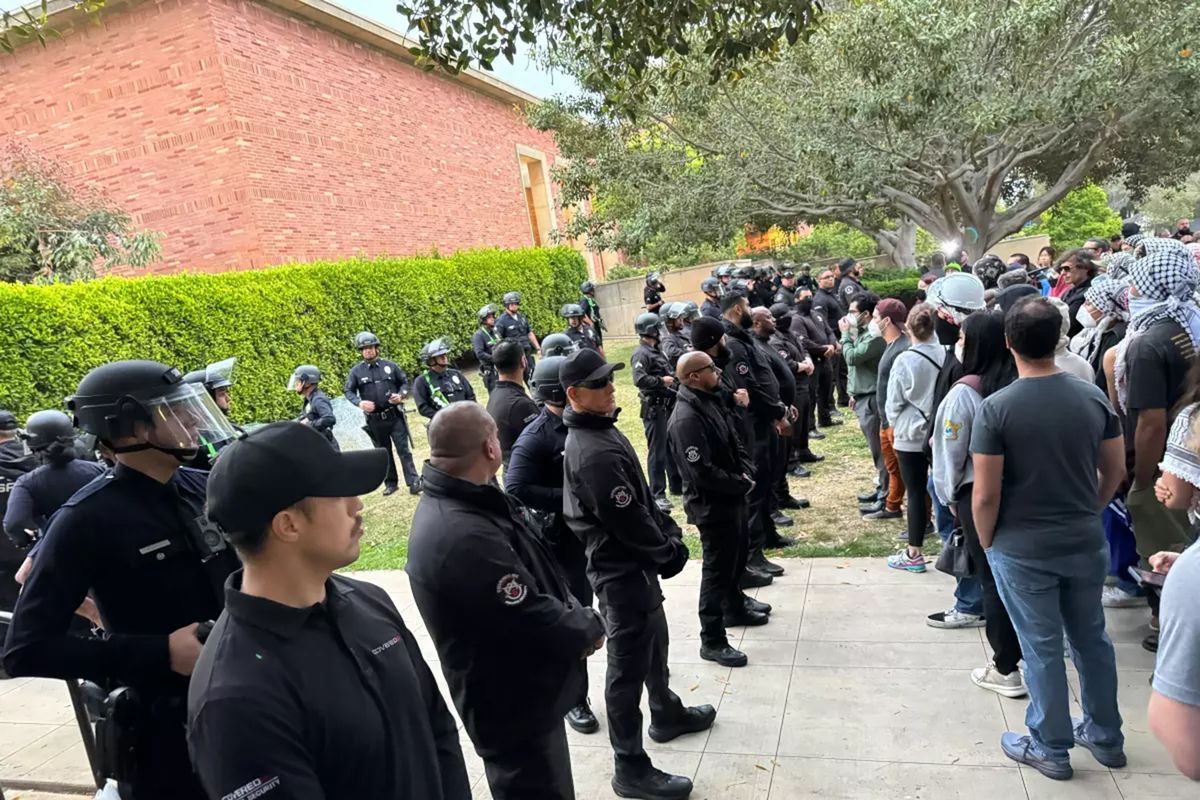25 Pro-Palestinian protestors arrested at UCLA, ordered to stay away from campus

LOS ANGELES — A Pro-Palestinian protest at UCLA Monday night ended with police making dozens of arrests and ordering demonstrators who were cited to not return campus for at least two weeks, officials said.
The confrontation came after protestors roved around campus earlier in the day reciting the names of some of those who have died in Gaza, the latest of several protests on the campus in recent weeks.
Demonstrators dyed the waters of the Shapiro Fountain red, as seen in aerial footage from local TV stations. For several hours, the demonstration was mostly peaceful. The situation later turned chaotic, however, with Los Angeles police and private security guards forming a skirmish line and facing off with protesters who stood behind barricades.
A crowd formed on the opposite side of the skirmish line, with protesters chanting, “Let them go!”
Associate professor Graeme Blair, who is a member of Faculty for Justice in Palestine, said one student went to the hospital for treatment of wounds from a rubber bullet, which he said was fired when students were in the camp near Dodd Hall. He criticized authorities, saying the students had been following dispersal orders throughout the evening.
UCLA Police said in a statement late Monday that about 25 protesters were arrested on suspicion of willful disruption of university operations. The protesters would be cited and issued 14-day stay away orders from UCLA’s property and then released, police said.
The statement said the group tampered with fire safety equipment, stripped wires from electrical equipment and caused other damage on campus.
Police had previously ordered the demonstrators to disperse at least twice, and the crowd quickly dismantled tents and barricades and moved to different locations on campus.
As protesters marched, one among them was reading aloud names of Palestinians killed.
“They will not die in vain,” protesters chanted after each name. “They will be redeemed.”
Some protesters set roses down next to a coffin painted with the Palestinian flag that sat alongside fake bloodied corpses. A helicopter hovered overhead.
Many protesters declined to give interviews, saying they were not “media liaisons” or “media trained.”
The event was organized by the Students for Justice in Palestine at UCLA. Several faculty members followed the crowd with a banner showing support for the students and the demonstration.
Monday’s event marked the third pro-Palestinian encampment at UCLA in recent weeks, the handling of which has drawn outrage and questions about how ill-prepared the university was for such an event.
The first one was set up April 25, sparking mixed reactions and a largely peaceful counterprotest on April 28.
Two days later, however, UCLA declared the encampment unlawful and directed campus members to leave or face discipline.
Later that night, a violent mob attacked the camp. The few police officers on duty were quickly overwhelmed, and the violence continued for three hours until authorities finally brought the situation under control.
At Monday’s demonstration, most protesters wore surgical masks, and those at the edges of the moving encampment held makeshift wooden shields or set up chicken wire to barricade themselves in. The crowd moved from the courtyard outside Royce Hall to the bottom of the Tongva steps, to the patio behind Kerckhoff Hall, to a courtyard outside Dodd Hall.
As evening set in, the protesters set up their barricades in the Dodd Hall courtyard. The confrontation escalated as an unlawful assembly was declared. Police and guards formed a line, with protesters shouting, “Cops off campus!”
UCLA professor Yogita Goyal, who teaches English and African American studies, was among faculty on campus Monday expressing support for the protesters. Goyal said police should not have declared an unlawful assembly on Monday — or on April 30 when students were protesting peacefully.
“UCLA leadership should be out here and should be allowing our students to express their political views,” she said.